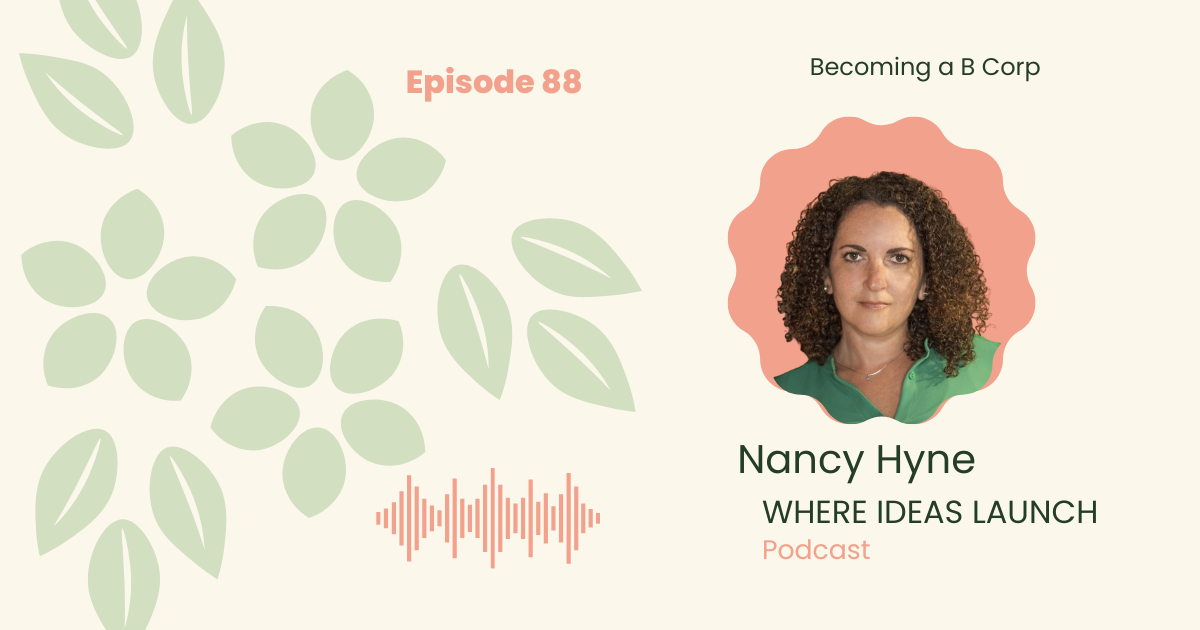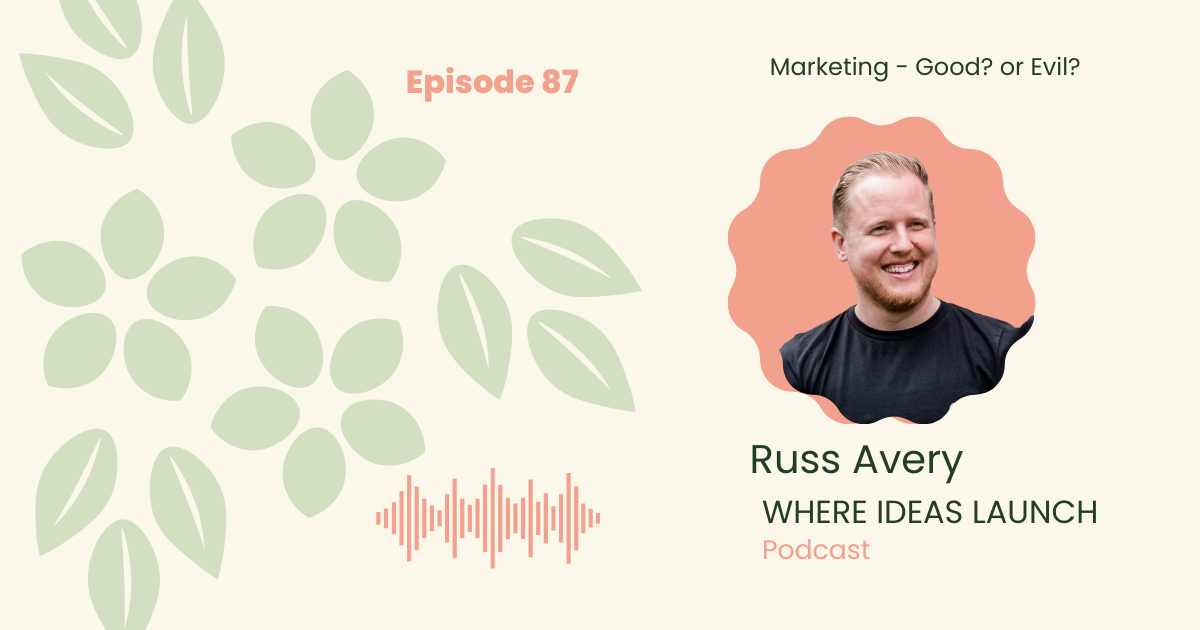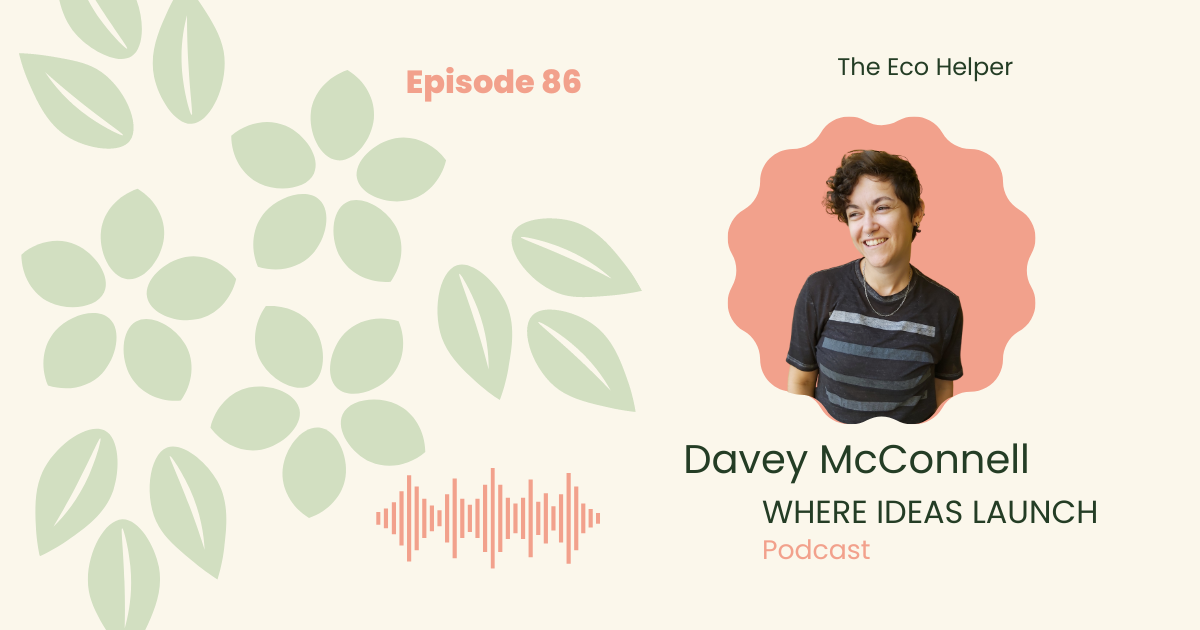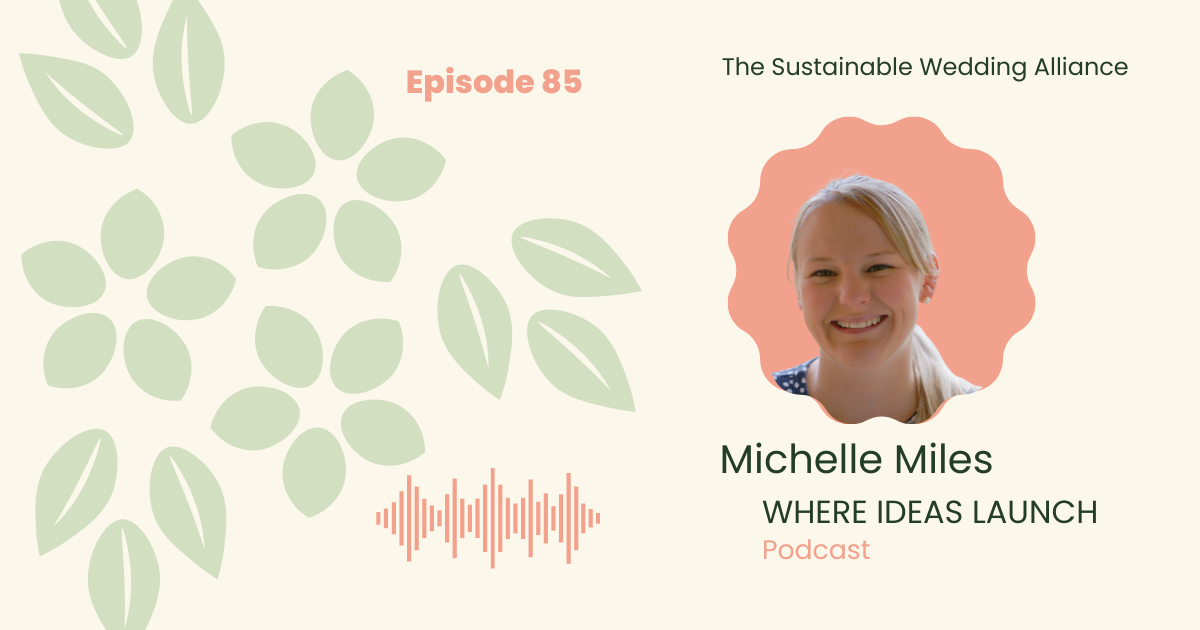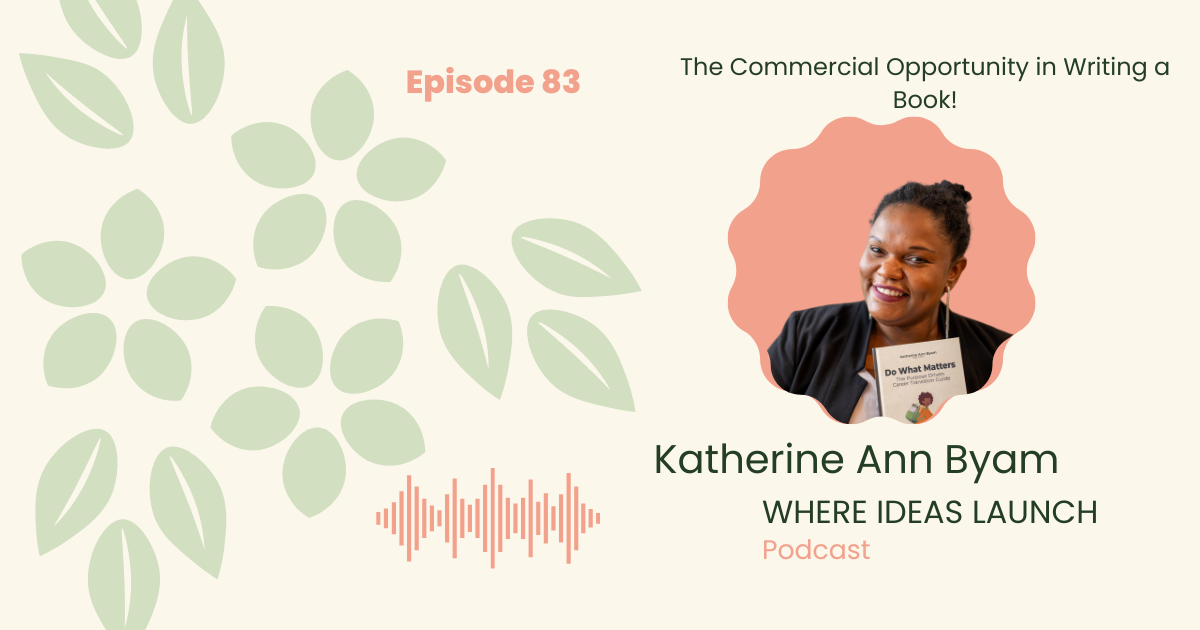096 Neurodivergence in Business
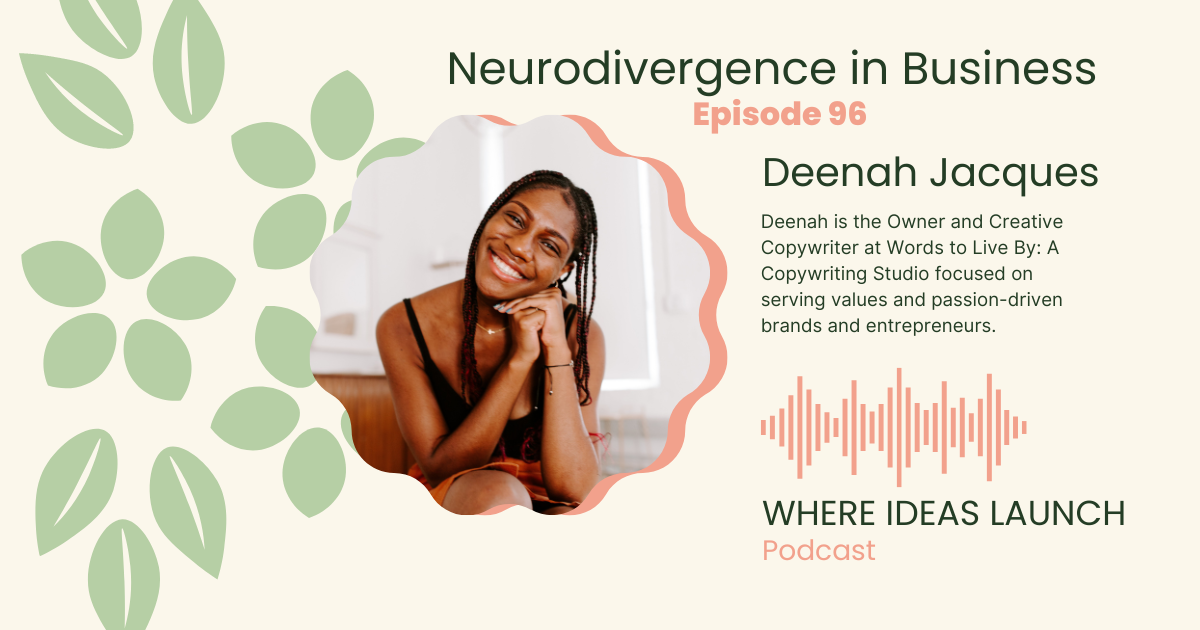
Listen to the Episode
About This Episode
Deenah is the Owner and Creative Copywriter at Words to Live By: A Copywriting Studio focused on serving values and passion-driven brands and entrepreneurs.
Specialising in Brand Messaging, SEO Website Copy, and Email Marketing, Words to Live By is committed to writing copy that is backed by psychology and poetically executed.
Subscribe to Where Ideas Launch
Connect with Deenah
Get Deenah's 52 Email and Lead Magnet Prompts
Words to Live by Freebie
Episode Transcript
Katherine Ann Byam 0:00
What's it like being a neurodivergent business owner, the pros and the cons?
Deenah Jacques 0:05
I like to say that I'm empathetic not only as like a value, but as a person. And you know, that's why I pursued social work. But I also have this higher level of sensitivity because I don't want people to go through the experiences that I went through and struggling with navigating the system. And a con is that a lot of things still aren't made for me and it's frustrating that I still have to jump through hoops to find something and that things aren't as accessible to me and to other people who I could be serving. Of course, there's definitely going to be other business owners, other entrepreneurs and brand leaders who have different abilities, and you know, how are they going to navigate these things, it definitely pushes me to leave things better than when I found it.
Katherine Ann Byam 0:57
This is Season Five, the great debates of our times, Season Five will be centred around the great debates. And we will be comparing and contrasting different viewpoints on various topics that are consuming the public discourse at present. The reason I've decided to take this approach is because, we or at least many of us, are losing the skill of debate. And I think this is an essential skill for us all to practice once more. I don't see how we get to the point of saving the world and saving our planet, if we don't know how to discuss our differences. I also think that the solution to most of our challenges is somewhere in the spectrum of views but never at either extreme. I will be working with guests to curate the content and discuss beforehand, I will understand their positions, their areas of genius, and navigate my questions around that so that the conversation is challenging and stimulating without being combative. I hope you enjoy Season Five of Where Ideas Launch; The Sustainable Innovation Podcast. Deenah is the owner and creative copywriter at Words To Live By, a copywriting studio focused on serving values and Passion Driven brands and entrepreneurs specialising in brand messaging, SEO website copy and email marketing, Words To Live By is committed to writing copy that is backed by psychology and poetically executed. Deenah, welcome to Where Ideas Launch.
Deenah Jacques 2:25
Thank you for having me.
Katherine Ann Byam 2:26
It's really a pleasure to have you. And I want to get in a little bit to your background and understand how you got here to being in copy and becoming an SEO specialist, in fact?
Deenah Jacques 2:36
I took creative writing and I also majored in social work. So I branched off into the social work world, I worked in social services with children. And in the middle of the pandemic, I figured I should do something more creative and writing focused again, and I Googled, you know, side jobs where I can write and writing jobs I can make a livable wage. And I found out about copywriting. And at first, I wasn't sure about copywriting because I always imagined like corporations and working with an agency. But I was seeing, you know, copywriters who are working with smaller or mid sized businesses, and they had more like intimate connections with these entrepreneurs. And that's what I decided I wanted to focus on. I'm really love working with community driven businesses and local business owners and smaller businesses.
Katherine Ann Byam 3:30
Let's go now into freelancing and why you decided to pivot to, to freelancing with your business and why for purpose brands, why choose those categories of brands?
Deenah Jacques 3:43
I wanted to pursue freelancing because I figured I would travel once COVID was over. But of course, COVID lasted, you know, the pandemic lasted, you know, two ish years, but I figured, would give me more independence, I wouldn't be tied down in red tape and bureaucracy that I was trying to get away from. And my background is in social work. So I figured I you know, I've always been passionate about activism. And like these grassroots organisations, so I figured working with purpose driven organisations would be the way to go or purpose driven brands, because I would still have that social justice aspect of working with companies that are actually making a difference in the world, and they're giving back to their communities.
Katherine Ann Byam 4:36
Yeah, I like that, and I want to tap into something now, because before we got on to pressing record, we spoke about your origins and my origins, and we're both from the Caribbean. You're from Haiti, and I'm from Trinidad and Tobago, and I wanted to talk about this because in my experiences in the last four years in particular when I made my own pivot to sustainable business, to purpose driven business, I found that it's quite a challenge to meet other people like me in this space. And I got to talking to a few people about it. And one of the reasons that came up was that many people think that sustainability on the whole is a bit of a white privilege conversation. And I just wanted to know what your reflections are on hearing something like that. And what are your thoughts?
Deenah Jacques 5:25
Yeah, I mean, I understand why people might think it might be something that maybe like the upper echelons of society might, you know, be able to be more sustainable because of companies like Whole Foods, which are tend to be expensive and organic, but that's not actually true, especially coming from an immigrant family, we repurpose and reuse everything, like my grandmother would always see like yoghurt containers and use it to store stuff. And in Haiti, people don't really have the means for a lot of things. They don't have, you know, the electricity, electrical sources that we have. So they, they find a way to make things work, and that's carried over to America, you know, my parents would always save food for longer than they should have. But they, you know, were very adamant that they weren't gonna throw anything away. Like that's kind of dripped into my ethos, like, I don't want to waste anything. I want to use every little bit of everything, I reused different things that other people might think is like funky, but I'm like, well, you know, it has a purpose, you know, why not use it? So I think that's definitely something that maybe people if you, if you didn't grew up in a family of immigrants, first generation, second generation, you know, you wouldn't really see that. But looking back, I'm like, you know, we were pretty sustainable.
Katherine Ann Byam 6:56
I know exactly what you mean. So for example, my mum, she's exactly the same, like she won't throw a single thing away. And the minute I start throwing things away, she gets upset with me, like, she gets absolutely annoyed, I was going to use that. And I grew up with that. And I definitely, I think in my early 20s, I definitely kind of rebelled. So I know that I spent way more money than I needed to spend, they bought a whole lot of stuff that ended up going to charity. But there was never an idea of throwing anything away. If I was doing something like like giving it away, it had to go to charity, it had to be repurposed, it had to find another home. And that's always been in my culture. So you're absolutely right in that way. And I totally share that. And then the other aspect of it, you know, sort of growing up outside of, let's call it the Big West, the rich West is there, this whole idea of community was so important. So it's never just you like, like, right now, I don't know, my neighbours, like, I wouldn't share my food with my neighbours, for example, if I had leftovers, and I think I wouldn't get to eating it, even if I know my neighbour comes home late or whatever, like, it's just not done. Whereas, you know, in Trinidad, it's all about the community, it's all about the network around you. And you would, you would share everything right, if you have fruits in your garden, you would pick them, you would have a big harvest, and you'd go share it on, with everyone on the street, right? And that kind of culture is not something that I've been able to recreate in the UK, for sure, so it's something that I miss.
Deenah Jacques 8:21
Yeah, definitely. That's another good point. Because I was actually talking about this with a friend how, you know, I'm coming from more of like a communal background where extended cousins and my grandparents, you know, we all lived together, we all shared everything, there's hand me downs. And once those hand me downs were done, we would again, you know, like you said, donate it to charity, or to the church. And yeah, I feel like once we kind of moved away from that, once we, you know, my cousin's moved farther and farther away, you know, I kind of expected that to be like everyone, you know, I remember my friends saying she saw her cousin at the movie this, the other day, but she didn't say hi to her. And I was like, shocked, like, that's her cousin, like, what do you, you know, how come you, you know, weren't happy to see her. And that was really odd to me that people in the West are kind of more distant. And you know, we're focused on independence and individualism. But I think that kind of, that has, you know, its pros and cons. And unfortunately, I think I've seen more of the cons now.
Katherine Ann Byam 9:27
I completely, completely hear you. So we're going to change tacks again. And now I'm going to go into more around your field and to explore that a bit. So how we compete as ethical businesses is an ongoing challenge. And we have to come up with really great persuasive ways of communicating what's important about a purpose and about the social justice or climate justice or other form of justice that we want to see come to fruition in the world but at the same time, we don't want to come across like some of the other brands. Because there's loads of ethical considerations. There's greenwashing, there's all of this stuff that we need to consider. What are your thoughts on how your field of copy and SEO and all of these things are currently helping or harming small businesses?
Deenah Jacques 10:17
In marketing in general, I've seen more of like this conscious and slower way of marketing and intentional way of speaking to people and how that has branched down into more ethical marketing tactics, instead of using a false sense of scarcity or urgency or, you know, being more accessible in payment plans. That's kind of what I've noticed. But I've also, when working with brand designers, and web designers, I think there's more of a challenge. And maybe you're working with packaging distributors, and it's more expensive, or it's harder to find packaging that's eco friendly. I think it's opened up demand for more eco conscious products, people are being conscious about energy and using green energy. But I also think it could be a con because I can see this being like a trend and people not necessarily caring about sustainability. But they want to, I guess, you know, like greenwashing, essentially just saying it so that people are attracted to their, their brands. And so I think it's important to talk about the intentionality behind why you're doing what you're doing. And that's what I mean, well, you know, working with purpose driven brands, there's a purpose in, behind everything, and they're not doing things just for show they're doing it because they really believe in that that's a value of theirs.
Katherine Ann Byam 11:45
Yeah, absolutely. Tell us a little bit about successes that you've had so far. And also what surprised you about your journey and your pivot into this space.
Deenah Jacques 11:54
I guess, just you know, it's finally seeing, like my work, especially in marketing come in to fruition because I had the struggle with social media marketing, and, you know, Facebook groups, and there's, you know, part of me knew I knew had to do it, but I just was so stuck in how to do it. And I was exhausted burning myself out doing it in a way that was not beneficial for me, but you know, finally able to find a method or rhythm that works for me, and seeing you know, people respond to that, that what you say, finding my own, I guess, kind of system, what surprised me - that I would continue to be learning. When I first started out in the business realm, I was really adamant that I wasn't going to pay for a course I was just going to read books and consume as much free content as I can, which is great, but free content does have a limit. And I am someone who likes to ask questions. I'm like slightly neurodivergent. So I kind of need people to hold me accountable and to kind of support me as well. So you know, I invested in classes, and I do love learning. I'm a lifelong learner, but I was just really adamant, I guess that I wouldn't, you know, be paying for courses, I didn't really have the best school experience. So that was something I didn't want to do. But all of those courses that I've taken have shaped me and made me a better copywriter and have helped me sharpen my skills. It's given me a community and a network of people that I can turn to. And I feel like I've gotten where I am faster compared to other people. I've seen other people who maybe took that didactic route, and they're starting to do things that I had already been doing them like, wow, you know, I'm, you know, I'm not so far behind. So.
Katherine Ann Byam 13:48
Yeah, I love this. And I want to tap into it, if you don't mind. What's it like being a neurodivergent business owner, the pros and the cons?
Deenah Jacques 13:56
I like to say that I'm, you know, empathetic, not only as like a value, but as a person. And you know, that's why I pursued social work. But I also have this higher level of sensitivity because I don't want people to go through the experiences that I went through and struggling with navigating the system. So I would say that's definitely a pro. And a con is that a lot of things still aren't made for me. And it's frustrating that I still have to jump through hoops to find something and that things aren't as accessible to me and to other people who I could be serving who, you know, people don't have to disclose if they're neurodivergent or whatnot, but of course, there's definitely going to be other business owners, other entrepreneurs and brand leaders who have different abilities and stuff and you know, how are they going to navigate these things? It definitely pushes me to make you know, my mark and to leave things better than when I found it.
Katherine Ann Byam 15:01
That's so powerful. Thank you for sharing that. And I want to reflect on something. So I think I'm a bit older than you, like, like maybe by a lot. But when I was growing up, we didn't have conversations about neurodivergent. And today, like, now I reflect on, on my childhood and stuff. And I can see, like all of my friends who were probably neurodivergent, and I didn't understand it, or even myself, like, I can see where I was, potentially, I'm potentially touched with it as well. And I can see in my partner and, you know, I can see these things now, but we didn't have this knowledge, we didn't have this understanding. And instead of helping to help you evolve, you just learned that you just had to do it the mainstream way, right, like, you know, from getting a job to studying to, you know, getting anything done. And today, like, I'm so pleased that there's so much more open conversation about this stuff, first of all, and that it's now okay to actually say; hey, hang on, you know, like, I need things in a different way. Whether it be in a work situation, if you're, even when you're freelancing, like I can imagine, if you're working for non-neurodivergents, they may not understand the flexibility that you need to deliver on your job, and stuff like this, right. But now, it's a lot easier to have those conversations. There's still a group of people who don't understand it. But slowly and surely, it's becoming more commonplace. And I really appreciate that we can we can tap into these things.
Deenah Jacques 15:01
Yeah, definitely. I think that continuing to have conversations like this definitely helped. But I think if you aren't, you know, neurodivergent, you still don't see like, the gaps may be in your marketing or in your business that could potentially confuse people. So I think it's definitely good that people are becoming more aware and speaking up about it.
Katherine Ann Byam 16:48
Yeah, that's a challenge as well, because even for the neurodivergent, we're going to miss things. Because we understand things in a certain way, as well, like, oh my God, me and my partner, we have these debates all the time. So I'm a bit ADHD and I will go faster. So I will speak like way ahead of my mind in some ways, and sometimes I miss things in the conversation, and he will be left at the point where the gap was, and he wouldn't have understood anything I said after that, you know, whereas for him is like, he just needs details, details, details. And it's like we're kind of on the opposite spectrums. And it's really difficult for us to meet in one common place, you know, and, and I think that this is, it's such an important thing, as you say, conversation is how we get to the point of getting everyone in the spectrum as opposed to one end or the other end. And, and it's definitely a challenge. So I want to move now two challenges and obstacles. And you know, we've kind of spoken about this a little bit. But tell me a little bit about how you've worked through some of the challenges you faced?
Deenah Jacques 17:52
Yeah, I would say challenges I faced, maybe were more internal and a lot of self doubt. And I tend to overthink and that kind of lead to over analysis paralysis, I found out that's like an actual word. And that's definitely what I would say was happening to me where I just didn't really do anything, because I was so confused and stuck on what to do. And it took me a while to come out of that and to finally realise that I don't have to be perfect. And if I mess up people, they either won't notice or if they do notice they'll forget about it. So I would say that's definitely been like my biggest challenge in starting my business.
Katherine Ann Byam 18:34
And I want to move now to goals and Words To Live By, it's a great name by the way, tell me about your big hairy goals for what you want to do next.
Deenah Jacques 18:44
Well I definitely want to continue to have these conversations with people, especially with other entrepreneurs and with other peers so that they can understand how to be more inclusive of people of colour, people with different abilities, because there's a lot of things in the space that I see. And I'm like, oh, I don't think they meant to say that, I don't think they understand like the repercussions of their words. So I definitely think having more of these conversations, I definitely want to do that and you know, continue to learn and to continue to get better at my craft I would say, I would love to have more I guess of these purpose driven brands coming to me and resonating with me and just hearing from more of them and how I can best serve them with copywriting or with other resources in my network.
Katherine Ann Byam 19:39
I want to get now some tips because we've talked a lot about many things and there's so much I don't even know where to start with the tips. But probably I'm gonna start with this can you give us some tips on writing to be more inclusive? First of all.
Deenah Jacques 19:54
I would say definitely think about yeah, the language that you're using, for example, I've seen in a lot of sales pages, people using this term action takers, if you're an action taker, you will be rewarded with, you know, $500 off the course. And to me, that doesn't seem fair for someone who has like, you know, a slow processing disorder speed, slow processing speed, or who's has debilitating anxiety to see that and you know, that's definitely going to be like a turnoff or like a red flag to them that you're essentially saying that they can't take action. You know, I would say, there's a lot of things I'm about to write a blog post on things that I have seen, you know, feel free to reach out to me if you feel like there is a word or something that you're not sure it would be right to use, or if it could be potentially inaccessible. But even you know, things like copywriting, for example, and design are big investments. It's not cheap. It's very expensive. And for good reason, of course, but I see this narrative of if you don't invest in yourself, how are other people going to invest in you, and that I'm not okay with that. Because that completely ignores the privilege that you have, and that other people don't have, especially if you're a person of colour, or if you're in a marginalised people group, people want to work on themselves, and they are, you know, building brands to, to get out of, you know, these stigmas and to have a better life for themselves. And to see that, you know, completely ignores the fact that there are systems in place that makes it harder for people to get, you know, a business loan, or that still kind of hard to get a grant or how do you even write a pitch deck? You know, those are things that you don't know, unless someone teaches you, and maybe someone hasn't taught you that? So just things like that. I'm always just very wary about and everyone's, you know, learning, I think so. This isn't to shame, you know, if you have used tactics like that before, now, you know, you know, maybe to be more cautious about that. And yeah, just to, you know, anything that has to do with learning or with, you know, privilege, I think, like you said, there are more conversations about that. So I know that more and more people will be talking about it, at least I like to think that we're all out here to help each other get better at how to market to people.
Katherine Ann Byam 22:31
And what about SEO optimization. And I want to just preface this because we we got into a lot of conversations today. And we didn't really talk about SEO. But I want to touch back on on why SEO because a lot of business owners have focused on building their business through their networks and through building communities and stuff like this. And the whole part about SEO is kind of popped because it sounds too hard. It requires so much content, how can we break down some myths bust some myths about SEO and like help people to embrace this in the design of what they're creating for their business?
Deenah Jacques 23:08
I would say like I was one of those people who was like, oh, SEO is definitely going to stifle my creativity. I don't want to, you know, learn about that. But the goal of SEO and you know, optimising your content is just to provide a better user experience for your people. So it's people driven first. And I think that kind of breaks down maybe those fears. It's all about, you know, serving your people and being accessible to more people so people can find you and the awesome things that you're doing. I think that SEO people get very caught up in trying to trick the system or trying to find shortcuts. And the one thing you just want to focus on is write content that people have questions about that people are asking you about that you know your people could benefit from. That's really the main important goal of SEO, and then all those other things, the optimisation, the keywords, the all those little nuances, all those little discrepancies, technical stuff. Those are second, Google prioritises content. That's why I've seen pages that have great content, but I can tell that it wasn't optimised but it's still on number one. So not to say that you can just write whatever you want willy nilly, but you could go that extra mile. You do want to make sure that you're not keyword stuffing, using the same keywords so that Google can pick up what your article is about because that essentially makes it harder for people to read. You know, it's making sure that your texts are broken up because it's easier for people to read texts that are bulleted and have highlights that are italicised, it's again, going back to accessibility and neurodivergence, it's better for people who have maybe a harder time reading those. I mean, I think everyone would have a hard time reading a big block of text. And you know, just making sure to use your keywords in a way that is just natural, making sure to have images that aren't too large, for example, so that it doesn't slow down the page speed. It's little things like that, that really can help.
Katherine Ann Byam 25:22
Thank you so much for your conversation today. And for sharing so much with us. I think I hadn't really understood as much about accessibility and SEO until today. And like you say, you know, we take the opportunity to learn wherever we can and whenever we can. So I appreciate you for that. And how can my listeners get connected with your work to learn more about neurodiversity and copy and to learn more about SEO? In fact.
Deenah Jacques 25:46
You can visit me on my website. It's www dot words to live by writing.com or on Instagram at Words To Live By writing.
Katherine Ann Byam 25:55
Thank you so much Deenah, it's been a pleasure to host you today.
Deenah Jacques 25:58
Thank you for having me.
Katherine Ann Byam 26:02
This podcast is brought to you today by the brand new Women In Sustainable Business Awards that kicks off in 2023. If you're a business owner who's starting a business with principles of sustainability in mind, and you want to preserve some lost skills, some handcrafting, artisanal work, or you're a social media manager supporting purpose driven brands, or you're creating fashion, or something that is relevant to the sustainability and green transformation, you are more than welcome to join us, and to get involved in these awards. Check out our group, on Facebook; Woman In Sustainable Business, or follow the podcast; Where Ideas Launch, on Instagram to find out more.




